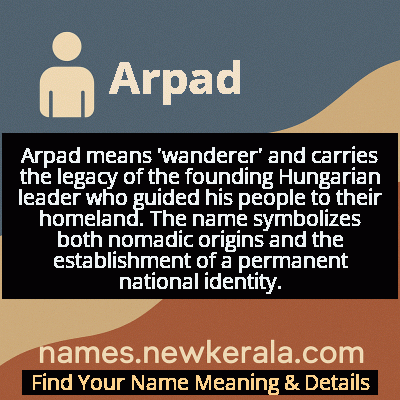Arpad Name Meaning & Details
Origin, Popularity, Numerology Analysis & Name Meaning of Arpad
Discover the origin, meaning, and cultural significance of the name ARPAD. Delve into its historical roots and explore the lasting impact it has had on communities and traditions.
Name
Arpad
Gender
Male
Origin
Hungarian
Lucky Number
4
Meaning of the Name - Arpad
Arpad means 'wanderer' and carries the legacy of the founding Hungarian leader who guided his people to their homeland. The name symbolizes both nomadic origins and the establishment of a permanent national identity.
Arpad - Complete Numerology Analysis
Your Numerology Number
Based on Pythagorean Numerology System
Ruling Planet
Uranus (Rahu)
Positive Nature
Strong sense of order, loyal, practical, and disciplined.
Negative Traits
Stubborn, overly serious, rigid, and prone to feeling restricted.
Lucky Colours
Blue, gray.
Lucky Days
Saturday.
Lucky Stones
Blue sapphire.
Harmony Numbers
1, 7, 8.
Best Suited Professions
Managers, engineers, accountants, organizers.
What People Like About You
Dependability, discipline, practicality.
Famous People Named Arpad
Árpád
Tribal Leader
Founding father of the Hungarian nation who led the Hungarian conquest of the Carpathian Basin
Árpád Göncz
Politician/Writer
First President of post-communist Hungary (1990-2000) and prominent literary translator
Árpád Sterbik
Handball Player
World champion handball goalkeeper considered one of the greatest in the sport's history
Árpád Pusztai
Biochemist
Renowned food safety researcher known for his work on genetically modified foods
Name Variations & International Equivalents
Click on blue names to explore their detailed meanings. Gray names with will be available soon.
Cultural & Historical Significance
The name carries the weight of Hungary's founding mythology and serves as a constant reminder of the nation's origins. Throughout Hungarian history, the name Árpád has been invoked during periods of national revival and resistance, particularly during the 19th century Hungarian Reform Era and the 1956 Revolution. It represents not just historical leadership but the enduring spirit of the Hungarian people and their journey from eastern wanderers to central European nation-builders. The name continues to inspire national pride and serves as a link to Hungary's distinctive cultural identity within Europe.
Extended Personality Analysis
Individuals named Árpád typically exhibit strong leadership qualities, independence, and a pioneering spirit reflective of their namesake's legacy. They often possess natural authority and the ability to inspire others, combined with a deep sense of tradition and cultural pride. These individuals tend to be determined and resilient, capable of navigating challenges with the same fortitude that characterized the original Árpád's leadership during the Hungarian conquest.
Árpáds often demonstrate a blend of practicality and vision – they can manage immediate concerns while keeping long-term goals in sight. They typically value family heritage and cultural roots, yet remain adaptable to changing circumstances. Many bearing this name show a strong connection to nature and outdoor activities, perhaps echoing the nomadic origins of their namesake. Their personality often balances traditional values with progressive thinking, making them effective bridge-builders between past and future. While they can be stubborn in defense of their principles, they also possess the wisdom to know when adaptation is necessary for survival and growth.
Modern Usage & Popularity
In contemporary Hungary, Árpád remains a respected traditional name, though its usage has declined from its peak popularity in the early 20th century. It is most commonly found among families with strong national consciousness or those wishing to honor Hungarian heritage. The name maintains a dignified, somewhat formal character and is often chosen by educated, middle-class families who value historical continuity. While not among the top 100 most popular names for newborns in recent years, it continues to be used consistently, particularly in rural areas and among families with noble or historical connections. The name enjoys periodic revivals during times of increased national pride and historical commemoration, and it maintains a steady presence in Hungarian society as a name that commands respect and evokes the nation's foundational history.
Symbolic & Spiritual Meanings
Symbolically, Árpád represents the journey from wandering to settlement, from tribe to nation. It embodies the transition from nomadic freedom to established order, carrying the dual symbolism of the open steppe and the fortified homeland. The name signifies foundation-building, leadership through challenging transitions, and the preservation of cultural identity during profound change. It represents the bridge between ancient traditions and modern statehood, between eastern origins and European destiny.
Metaphorically, Árpád symbolizes the archetypal founder – the visionary who leads his people to their promised land and establishes the foundations for future generations. It carries connotations of resilience, adaptability, and the courage to embrace new beginnings while honoring ancestral ways. The name also represents the Hungarian concept of 'honfoglalás' (land-taking) – not as conquest but as the fulfillment of destiny and the establishment of a permanent home. In modern contexts, it symbolizes the ability to navigate change while maintaining core identity and values.

